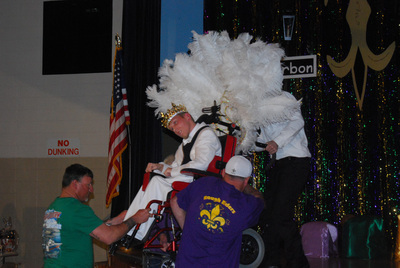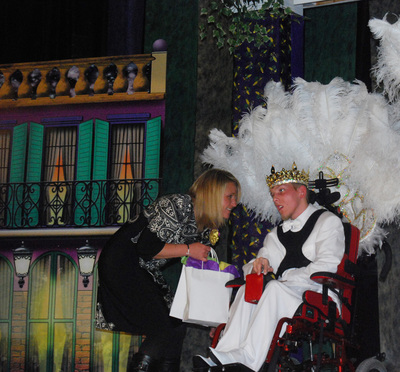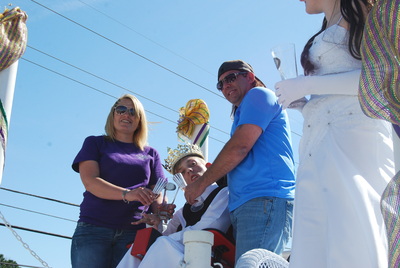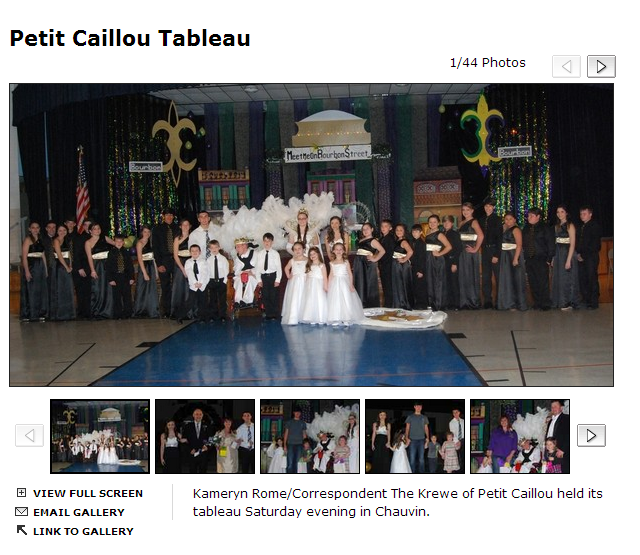Blair Luke stands taller than most although, he’s only around five foot tall. He usually has a bright smile on his face, and when he does, he tilts his head to the side. He has dirty blond hair, blue eyes and a goatee on his chin that his mother says has been there for two years. “He’ll only allow the lady who cuts his hair to trim it when he gets his haircut,” says Alicia Luke, Blair's mom.
Blair lives in a small Cajun town of Chauvin, Louisiana . It's a one red-light village with shrimp boats lined along the bayou. Blair’s dad, Frankie Luke, owns one of these.
Though his dad is a machinist, he will often shrimp on his off time and will sometimes take Blair with him. Blair enjoys being out on the water, driving the boat and helping his dad sell the shrimp.
“Just like any other shrimper, he has his own pair of white shrimp boots,” Alicia says as she begins to laugh. “I think Blair enjoys selling the shrimp the best because he gets to visit with the people buying the shrimp,”
Normally he has a really outgoing personality. He enjoys visiting and talking to everyone.
“Sometimes when he first meets someone, he can be shy,” his mother Alicia Luke says, “but normally he’s very social once he gets to know you.”
He’s curious about the world and always likes to know what’s going on around him. He usually pays attention to details. If someone tells him something, he’s going to remember it.
“He can tell you what you drive, where you live and other details. He pays attention to little things,” Alicia says. “We always laugh about that. They’re important to him.”
Blair has many ideas of what he wants to do when he grows up; he wants to be a mixed martial arts (MMA) fighter, a machinist like his dad or a disk jockey playing music.
Like most boys his age, he likes being outside, listening to country music, going to the local MMA fights and spending time with family.
Though Blair stands tall in most aspects of life, he sits in a red wheelchair . An X-shaped harness rests across his chest to mobilize him. He has a safety belt around his waist and a cushion between his legs to position him.
Blair was born prematurely and was diagnosed with cerebral palsy when he was two years old. He depends on his mother, friends and family to help him do the things that he can’t do on his own.
One thing that he sometimes needs help with is communicating. Blair's cerebral palsy has left him with speech and language difficulties. Although he is sometimes hard to understand, he's always able to communicate with his expressions, gestures and limited speech.
Through her abundant research on the subject, Alicia has come to describes cerebral palsy as a disorder that comes with a type of damage to the brain which causes a disconnect between the muscles and the brain.
“Cerebral palsy varies because some people might just have one side of the body with some spasticity in their arm or maybe a limb,” she says. “And then it’s sometimes so severe that some people might have to have a feeding tube. It’s a vast disability and symptoms can be very vast too. It’s kind of like the brain knows what to do but has problems getting it to the muscles or the actual reflex to do it. Usually, it’s something that happens with birth and doesn’t happen after the child is born.”
Cerebral usually refers to cerebrum, which is the affected area of the brain where the disorder is. Palsy means weakness or problems with using the muscles. The injury often happens before birth, during delivery or after birth. Blair's condition was caused through trauma sustained during his premature birth.
Blair was born premature at 27 weeks old on Feb. 28, 1997 at Ochsner Medical Center in New Orleans. His mother had been in the hospital for over two weeks before he was born.
“I had gone into labor early and that morning I was having a lot of bleeding, and I was losing fluid,” Alicia says. “They were trying to hold me off as long as they could. He only weighed two pounds and eight ounces. My husband and I were excited but also scared and anxious because we didn’t even get to hold him or anything. The doctors just kind of waved to us with his little hand in the incubator, and they brought him up right away to the neonatal intensive care unit (NICU).”
After Blair was brought to the NICU, his parents were only able to touch him and see him through the incubator. He was one-month-old by the time his parents got to hold him for the first time.
“It was so exciting,” his mom says. “We were so nervous because there were all these wires and tubes, but it was so exciting at the same time because we had been waiting for so long to hold him.”
He came home from the hospital with an oxygen tube, and needed oxygen for his first year. The couple didn’t bring Blair anywhere the first year because they didn’t want to risk him getting sick.
Although Blair was diagnosed with cerebral palsy at two, the couple knew that he had a disability. “We knew that something wasn’t right when he didn’t reach all the milestones that a baby would reach,” Alicia says. “You know rolling over, sitting up, that kind of thing.”
Blair never gained that independence, Alicia says. He always needed help and depended on his parents and still does today. They have to care for him, maintain his hygiene, and feed him.
His mother explains that cerebral palsy is not really a disease and cannot be cured, but there are different things that can be done to help him with his muscle spasticity over time. Some of the professionals that they seek help from are neurology doctors, developmental doctors, eye doctors, therapists, physical therapists and occupational therapists.
“There are different things that can be done medically to help with some of the symptoms such as physical therapy and occupational therapy,” Alicia explains. “We’ve done the Botox injections and phenol injections. He wears braces on his legs and has been to different doctors, treatments, therapies and lots of them. These are only some of the things that the doctors can do for him but there is no cure. This is something he’ll live with.”
His parents always tried to keep him involved in everything they could. “You know just try to give him the most normal childhood that we could. What’s normal today?” Alicia says. “We just tried to give him a childhood like everyone else. We played outside and we did all the other things.”
Alicia remembers taking him to McDonalds and carrying him up the stairs and through the tunnels in the play place area, until he got too big to carry.
Alicia had Blair when she was 18 and she and her husband lived with her parents in Chauvin after his birth, because they weren’t married yet and didn’t have a house of their own.
She and her husband Frankie met when she was 15. He was best friends with Alicia’s cousin and that’s how they met; the cousin lived next door and introduced the two.
“We didn’t get married right away,” Alicia says. “We were so young when we had Blair. We got ourselves settled and where we needed to be first. I finished school and started working.” She’s a girl’s physical education teacher for grades fifth through eighth and has been doing that for about 11 years.
For their son, they always focus on what they can do with him and how they can make it easier for him to be able to perform different tasks.
So has the community. This year, for example, Blair served as the king of the parade for the Krewe of Petit Caillou during Mardi Gras.
The community came together to make this a special experience for Blair. For the parade his mother stood near the float and threw his beads for him and his father drove the truck that pulled the float.
“We live in a small community and everyone knows everybody,” Alicia explains. “I think it made the community feel good seeing him as king.”
Alicia selflessly does most things for her son like picking him up from places, preparing him for school and making sure he’s fed and bathed. Blair goes to South Terrebonne High School and is in the 11th grade. When getting him ready in the morning she has to bathe him, get him dressed, brush his teeth, brush his hair and puts him on the bus for 6:30.
“It’s really a joy raising Blair,” she says as she gets a little choked up and starts to cry. “He’s probably taught us more than we could ever teach him about life, because you know, he just always has that positive outlook. He always takes things at a stride and always pushes forward,” she says as she starts to laugh as she turns to look at her son.
Although he spends most of his time with his mom, Blair and his dad, Frankie Luke, are close too. “He loves his dad,” she says. "He’s got the shrimp boat he’ll take him on or Blair will be outside when he’s doing yard work. He also likes to go hunting with his dad.” She explains that they will sometimes go deer hunting in Mississippi. Although Blair cannot physically hunt, he enjoys being able to observe and watch his dad hunt.
Frankie Luke also got him interested in watching the MMA fights. Blair enjoys going to the local fights put on by In Ya Face Productions , because the fighters treat him as if he is one of the team. “They are really awesome, and they include him,” Alicia explains. “He’s got a bunch of metals and stuff they’ve given him from the fights. He usually gets a t-shirt every time he goes.”
Some of the fighters dedicate their fights to Blair, and he can recognize most fighters by name.
“He has a red mouth piece, red gloves and red and black gym bag," Alicia says, adding that the "only thing that is missing for him to train is fighting trunks.”
He also says that one of his friends does third party work for MMA fighters, and he believes he would be a suitable fit for that. His mom kind of laughs, rolls her eyes but believes that things can be adapted for him to enjoy different experiences, even if it’s a bit far-fetched.
Alicia describes his biggest accomplishment as just being here because he had such a hard birth. Since then he has been king and a poster child for a cerebral palsy telethon.
In Blair’s life, his family, friends and community members enjoy adapting activities and day-to-day functions to make Blair’s life as normal as they can.
“Having Blair has changed my life dramatically,” Alicia says. “When I had him it’s never been about me. It’s focusing on him and making sure he has what he needs. I had to kind of learn to take things one day at a time and take them slow,” she says with a sincere tone. “I learned to trust in God and kind of put it in his hands and not to focus on the negative.”
Will Blair ever be normal? No, but his family and friends enjoy adapting activities and day-to-day fuctions to make Blair's life as normal as they can
“You learn what’s important real fast and what your priorities need to be.”






 RSS Feed
RSS Feed
